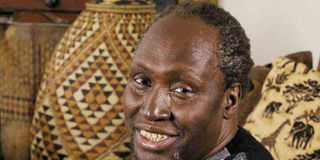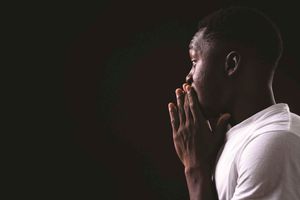
Renowned author Prof Ngugi wa Thiong’o.
A lot of ink has been spilt on Prof Ngugi wa Thiong’o since his passing two weeks ago at the ripe age of 87. So, I won’t plough those fields, or tread on roads already travelled. Instead, from my perch as a native of Kenya and fellow academic with him in the United States, I will shine some light on a few things. The first is to say Ngugi was simply an incredible writer and an unrelenting giant fighter against the subjugation of Africans by the West. The man didn’t give a damn what his detractors thought of his life-long political project fought in the vineyards and battlefields of letters with the barrel of a pen.
I came of age in Kenya just as Ngugi was being hounded and persecuted by the regime of Mzee Jomo Kenyatta. Ironically, the professor and Mzee Kenyatta – dubbed the Burning Spear – were ideological soulmates in history. In his academic sojourn in the United Kingdom, Mzee Kenyatta became a leading Pan-Africanist, gracing the anti-colonial Fifth Pan-Africanist Congress in Manchester in 1945.
Among the luminaries gathered were WE.B Dubois, George Padmore, Kwame Nkurumah, Kamuzu Banda, Patrice Lumumba, Ras Makonnen, and Nnamdi Azikiwe. Like Mzee Kenyatta, Ngugi became the towering figure of African literature, fighting against the same European and American imperialism in Africa and the Black World. Sadly, the two men ideologically diverged and collided in post-colonial Kenya. Ironically, it was Mzee Kenyatta who started the persecution of Ngugi, a job President Daniel arap Moi finished by exiling him in 1982. Ngugi never returned to live or teach in Kenya.
Decolonise Kenya’s educational system
My first encounter with him occurred in the late 1970s when I was a student at Alliance High School. Unassuming and almost shy, Ngugi, along with Prof Micere Mugo, Willy Mutunga and other left-leaning scholars, were the vanguard of a democratic beachhead at the University of Nairobi. As students there, many in my generation drank heavily from their cups of political wisdom. We still suffer from that intoxication. He, and they, left an indelible political imprint on our lives. In us, his legacy lives on.
In my last year at Alliance High School in 1978, Kamirithu, the theatre Ngugi established to decolonise Kenya’s educational system and the performance of theatre was all the rage. That’s really what got him into hot soup with the Jomo Kenyatta regime. But to us, Ngugi was a cult figure, a revered sage who lit the path for us. His books were already legendary in our minds.
I remember when in 1978 I won the awards for the best student in Arts at Alliance High School, I rushed to Textbook Centre in Nairobi and spent it all on Ngugi’s books. Those books are a cherished collection still in my library to this day. No other anti-colonial writer had more influence on me.
Nobel Prize in Literature
In 2015, I was pleasantly surprised by the professor’s presence at the annual New York African Studies Association conference. I hadn’t seen him in a long time. That year, I was humbled to receive from the organisation the Distinguished Africanist Award. Previous recipients included Prof Thiong'o himself, Prof Mahmood Mamdani, Prof Chinua Achebe, Prof Ali A Mazrui, Prof Micere Mugo, and other luminaries in Africa and Black academia. For me, Ngugi’s presence made the event seminal. When my name was called to receive the award Ngugi rose up immediately to join me on stage in celebration. It’s a moment I will never forget. It was a dream of any Kenyan boy growing.
I want to say two more things about Ngugi. Nothing in the academy has pained me more over the last 20 years than the blatant act of racism and bias against anti-colonial works by the Nobel Prize Committee. Year in and year out, I thought he would win the Nobel Prize in Literature, only for lesser writers to walk away with it. I have been stupefied and discouraged by the Nobel’s open racism. It’s one more reason the Black World should establish its own award. What’s even more painful was how far Ngugi had come to become the literary giant he was. Even more remarkable was his guts to write in Gikuyu, a truly revolutionary act.
Lastly, it wouldn’t be fair for me to overlook the accusations of domestic violence against Ngugi by his son, Prof Mukoma wa Ngugi, who teaches at Cornell University in New York. The son accused the father of physical cruelty against his mother. The allegations split the literary community. I am not a saint. But the revelations troubled me enough to skip the event honouring his iconic legacy in Atlanta last year. It pained me deeply. That said, Ngugi’s teachings, writings, and place in literature are etched in the sands of time.
Makau Mutua is SUNY Distinguished Professor and Margaret W. Wong Professor at Buffalo Law School, The State University of New York. He’s Senior Advisor on Constitutional Affairs to President William Ruto. X: @makaumutua







